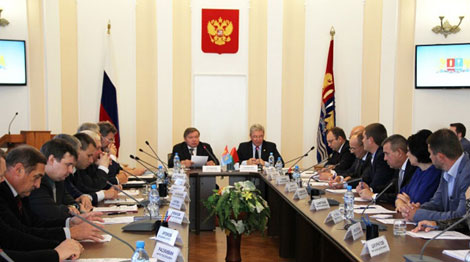Business news
Russia’s Ivanovo Oblast keen to boost cooperation with Belarus
 MOSCOW, 15 September (BelTA) – Russia’s Ivanovo Oblast shows interest in cooperation with Belarus in agribusiness, mechanical engineering, housing and utilities, road construction, light industry, and petrochemistry, Ivanovo Oblast Governor Pavel Konkov noted at the second session of the joint working group on Belarus-Ivanovo Oblast cooperation in Ivanovo, Russia on 15 September, BelTA learned from the press service of the Ivanovo Oblast government.
MOSCOW, 15 September (BelTA) – Russia’s Ivanovo Oblast shows interest in cooperation with Belarus in agribusiness, mechanical engineering, housing and utilities, road construction, light industry, and petrochemistry, Ivanovo Oblast Governor Pavel Konkov noted at the second session of the joint working group on Belarus-Ivanovo Oblast cooperation in Ivanovo, Russia on 15 September, BelTA learned from the press service of the Ivanovo Oblast government.
“The impetus given to our bilateral cooperation during the first session of our working group has brought quite tangible results, namely a big increase in Belarus-Ivanovo Oblast trade. It almost reached $100 million in 2016 and made up $46 million in January-July 2017,” Pavel Konkov said. He cited flax cultivation as an example of a promising field of cooperation. “We have a keen interest in developing domestic flax cultivation and processing. Russia President Vladimir Putin has given relevant instructions at the federal level. At the same time, Belarus has great experience in this field,” the governor recalled.
In turn, Chairman of the Bellegprom Concern Nikolai Yefimchik leading the Belarusian delegation praised the teamwork over the past two years as effective. “Our exports and imports see considerable growth in 2016-2017. This means that the private sector is moving forward rapidly,” he pointed out.
During the working group’s session, top executives of companies, representatives of public authorities, and non-governmental organizations specified the proposals voiced earlier this day. Belarusians said they are ready to export urban electric transport, electric buses, and lift equipment and set up dealing centers of the Belarusian tractor maker MTZ in the region.
As a result of the session, the working group signed a plan of action to develop trade, economic, scientific, and cultural cooperation between Belarus and Ivanovo Oblast in 2018-2020. The document is meant to boost trade, intensify social and economic collaboration at the interregional level, expand cooperation between light industry companies, arrange trips for businessmen, promote mutual supplies of agricultural products, assist libraries with the electronic exchange of information, organize cultural exchange events, develop tourism, strengthen cooperation between educational establishments. The plan of action contains a number of proposals on interaction between specific mechanical engineering companies.







 print version
print version make home page
make home page add to bookmarks
add to bookmarks

